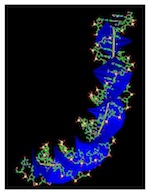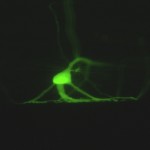Affiliate Professor, Biological Sciences
Professor, Mathematics and Statistics
| Office: | MP434 |
|---|---|
| Phone: | 410-455-2434 |
| Email: | khoffman@umbc.edu |
Education
Postdoctoral Associate, Institute for Mathematics and its Applications, University of Minnesota, 1997-1999
Ph.D. Applied Mathematics, University of Maryland, College Park
B.S. Applied Mathematics Interdisciplinary Physics, University of NH, 1991
Professional Interests
My work is focused on studying mathematical models of biological systems. I have several on-going collaborations:
Elastic Rod Models: I work with Dr. Tom Seidman on establishing existence and uniqueness of elastic rods with both hard and soft contact, which are more realistic models for DNA and many types of biofil aments.
aments.
Figure (rodfit): Elastic rod model of DNA
Neuromechanical Locomotion: I work with a group of researchers (http://rcn.ccs.tulane.edu/index.php5/Neuromechanics_and_Dynamics_of_Locomotion) studying different aspects of lamprey locomotion as a model system for vertebrate locomotion. My group specifically models the locomotion CPG, and works closely with biologist Dr. Eric Tytell to model experimental data, Dr. Tim Kiemel on control theory aspects, and Drs. Lisa Fauci and Megan Leftwich on computational and experimental fluid dynamics of the problem.

Edge Cell, courtesy of E.Tytell and J. Buchanan
Epidemiology: I work with Dr. Katie Gurski and Dr. Evelyn Thomas on models aimed at understanding the spread of sexually transmitted diseases across different sexual behavior, stratified by race and ethinicity.
Vertebrate Vision: I work with Dr. Phyllis Robinson on modeling the melanopsin phototransduction cascade. Our work on the deterministic model arose from the UBM@UMBC (http://ubm.umbc.edu/), and the stochastic model was developed in collaboration with the IMA Workshop (http://www.ima.umn.edu/2013-2014/SW9.9-13.13/).
Thalmic Reticular Nucleus: I work with Dr. Asaf Keller at University of Maryland, Medical School on models of the thalmic reticular nucleus. In particular, we are interested in understanding the effect of depolarizing GABAa and gap junctions on oscillations in the thalmic reticular nucleus of the brain.
Publications
A. Park*, K. Hoffman, and A. Keller, Roles of GABAA and GABAB receptors in regulating thalamic activity by zone incerta: A computational study, Journal of Neurophysiology, to appear
N. Massarelli*, K. Homan, J.P. Previte, Effect of Parity on Productivity and Sustainabilityof Lotka-Volterra Food Chains, J. Math Biol., 2013, (DOI) 10.1007/s00285-013-0746-7.
K. Hoffman and T. Seidman, A Variational Rod Model with a Singular Nonlocal Potential, Arch. Rat. Mech. Anal., vol 200, no 1, p 255-284, (DOI) 10.1007/s00205-010-0368-9, 2011.
J.P. Previte, N. Sheils*, K.A. Homan, T. Kiemel, E. Tytell, Entrainment Ranges of Forced Phase Oscillators, J. Math. Bio., vol 62, p 589-603, DOI: 10.1007/s00285-010-0348-6, 2011.
P. Varkonyi, T. Kiemel, K. Hoffman, A. H. Cohen and P. Holmes, On the Derivation and Tuning of Phase Oscillator Models for Lamprey Central Pattern Generators, Journal Computational Neural Science, vol 25, no 2, 245-261, 2008.
J. Guckenheimer, K. Hoffman, W. Weckesser, Bifurcations of Relaxation Oscillations near Folded Saddles, International J. of Bifurcations and Chaos, vol 15, no 11, 3411-3421, 2005.
K.A. Hoffman, J.H. Maddocks, & R. Manning, Link, Twist, Energy, and the Stability of DNA Minicircles, Biopolymers, vol.70, no 2, p.145-157, 2003.
K. Hoffman & F. Santosa, A Simple Model of Sheet Metal Assembly, SIAM Review, vol 45, no 3, 558-573, 2003.
Courses Taught
Math 485 Introduction to Calculus of Variations
Math 486 Discrete Dynamical Systems
Math 487 Continuous Dynamical Systems
Math 612 Ordinary Differential Equations
Math 614 Partial Differential Equations
Math 655 Calculus of Variations

